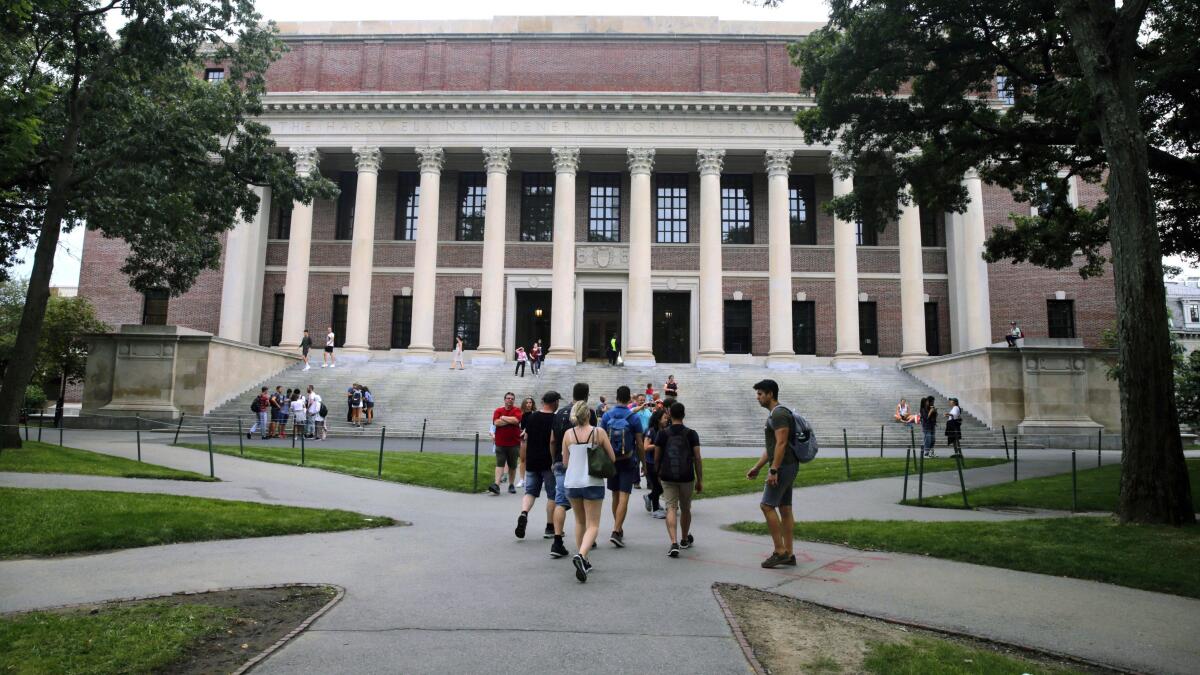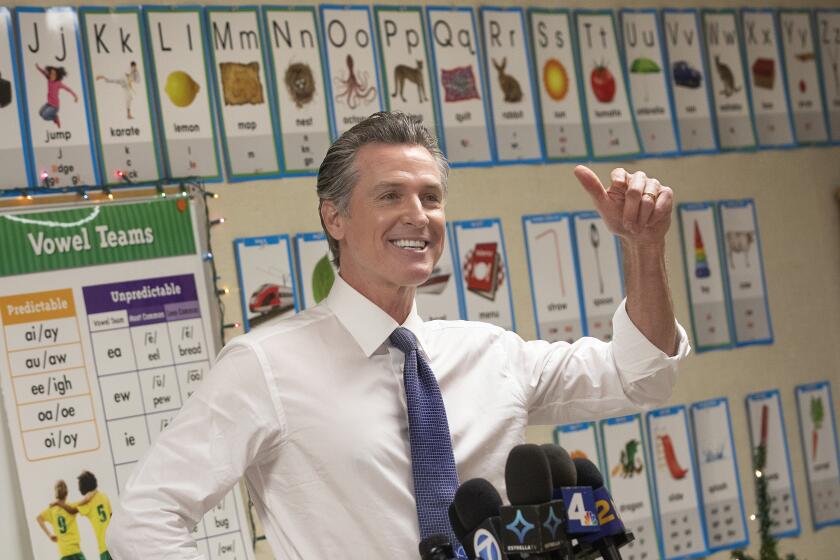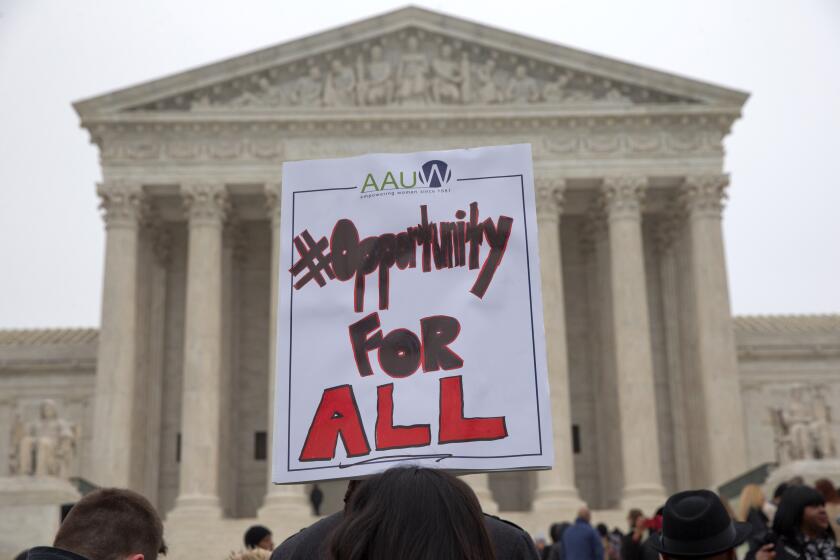Opinion: Rejected by a top-tier college? Don’t worry, it won’t hurt your chances for future success

- Share via
There is nervousness in the homes of ambitious American high school students awaiting the U.S. Supreme Court’s decision on affirmative action at the University of North Carolina and Harvard University. Will the justices upend preferences for certain racial and ethnic groups? Will they ruin the chances of many teenagers getting into a top school, which would bring them lifelong success?
The answer to the second question is no, regardless of how the court rules.
Affirmative action admission policies can help colleges achieve greater diversity on their campuses. But in the course of that public debate, we do college applicants great harm if we give them the false impression they will do better in life if they attend highly selective schools.
Long-standing research shows that except for some low-income students, being admitted to the most selective colleges has no significant effect on whether those young people achieve their dreams for life.
We’re all naturally fascinated with pecking orders. We can’t resist reading the latest rankings of colleges, restaurants, movie stars, even mouthwashes. Yet we don’t seem to notice that many of our bosses at work and leaders in government attended colleges and universities far from the top of the U.S. News & World Report rankings.
An Ivy League degree, high SAT scores and straight A’s are starting to signify privilege, not achievement.
The best research on the effect of college selectivity is still the 1999 study by Stacy Berg Dale, a researcher at the Andrew W. Mellon Foundation, and Alan B. Krueger, a Princeton economist who later became chair of the White House Council of Economic Advisors.
Their remarkable report, a National Bureau of Economic Research Working Paper titled “Estimating the Payoff to Attending a More Selective College,” examined 14,239 students at 30 colleges, ranging from the most selective, including Yale and Swarthmore, to less selective places like Denison University and Penn State. The students enrolled in college in 1976 and were surveyed on how much money they were making 20 years later.
Dale and Krueger found that those who attended more selective schools did “not earn more than other students who were accepted and rejected by comparable schools but attended less selective colleges.” They concluded that “unobserved characteristics,” such as persistence, humor and warmth, might have influenced success in life as measured by salary, but getting into the pickiest schools did not.
One exception, they said, was low-income students. Those who attended more selective schools on average earned slightly more. Since 1976, the racial mix of college students has changed, with the percentage of white students dropping from 84% to 54% by 2020, as the percentage of all other racial and ethnic groups rose. Whether that shift might alter the conclusions of the Dale-Krueger study is unclear; there’s been no comparable study addressing that issue.
A 2018 study by Suqin Ge, Elliott Isaac and Amalia Miller found that women who attended more selective colleges made more money than similar women who attended less selective colleges. But the reason appeared to be that women who attended selective colleges were less likely to marry and put their careers on hold for child rearing.
When race can no longer be considered for college admissions, equity advocates must take aim at the root causes of educational inequality.
We can see in our own lives and from academic research that successful people do not come only from ultra-selective schools. In fact, most people I have interviewed about how college helped them succeed point to a specific program, professor or even informal connection made on campus, not to the selectivity of the school itself.
The opportunities provided by American colleges, whatever their selectivity, appear quite obvious to young people from Asia and Africa who enroll here. Steve Becker, a former high school counselor in Pennsylvania, does a wonderful job of explaining how this works on his website, lesshighschoolstress.com.
He ranked colleges just before the pandemic by the number, not the percentage, of first year students with SAT math scores over 700 or ACT math scores over 30. Such people were in the top 5% of test takers. Here are the top 10 U.S. schools on that scale in descending order: University of Michigan, UC Berkeley, Ohio State, University of Wisconsin, University of Texas Austin, Purdue University, University of Washington, UCLA, Rutgers University and Texas A&M. He found Michigan had 5,200 of those top students in its entering class and Texas A&M had 3,300.
“So if you know very bright, hard-working students who feel like they have to ‘settle for’ Purdue because they were turned down by Northwestern or Notre Dame,” Becker said, “point out to them that they’ll have as many top-5% math students in their freshman class at Purdue as the other two universities put together.”
Becker also points out a 2012 study by the Chronicle of Higher Education on employers’ priorities when choosing applicants just out of college. The study ranked eight factors in deciding whom to hire. Here they are in descending order: nature of college internships, what jobs they had in college, college majors, volunteer experiences, extracurricular activities, relevance of coursework and grade-point averages. College reputation was the very last factor.
Much has been written lately about Americans losing faith in higher education, but there’s little evidence of that in the high schools I study, from wealthier suburban campuses to urban charter schools full of ambitious but lower-income students. The word “college” still retains a magic in those places.
We may still obsess over the college rankings and argue over what the Supreme Court does. But there is no question that colleges of every sort improve lives in innumerable ways, no matter what percentage of applicants they let in.
Jay Mathews is a journalist who has written eight books about education, including his college admission guide “Harvard Schmarvard.”
More to Read
A cure for the common opinion
Get thought-provoking perspectives with our weekly newsletter.
You may occasionally receive promotional content from the Los Angeles Times.












